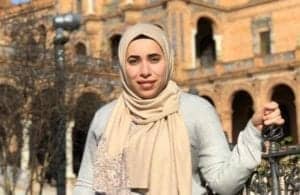Meet Nada El Masry, Co-Founder of RADIUS Refugee Livelihood Labs
In 2018, Nada El Masry co-founded the Refugee Livelihood Lab (RLL) as a way of building social, economic, and political capital for racialized refugee and migrant communities in Vancouver. RLL, a grantee partner of the WES Mariam Assefa Fund, is a social innovation lab housed within RADIUS at the Beedie School of Business at Simon Fraser University (SFU).
Nada grew up as a stateless refugee herself, making her efforts of supporting the success of refugees a deeply personal commitment. In the 1960’s, her family was displaced to Libya because of ethnic cleansing in their native Palestine. In Libya, like most Palestinians, Nada and her family were denied citizenship which limited their access to basic human rights.
“There were constant reminders that we did not belong; without documentation and continuously labeled as the other,” Nada recalls.
When she finally immigrated to British Columbia and obtained citizenship, those feelings of isolation and being “the other” sentiments remained. Despite the prevalence of Islamophobia and discrimination, Nada’s support for immigrants and refugees has been unwavering. She was determined to challenge the xenophobic narrative directed at refugees and racialized peoples.
Nada’s passion brought her to Fresh Voices Society of British Columbia, where she worked with racialized youth and allies to address the systemic barriers they often face. There, she began to shift the direction of her work toward building power for refugees.
“I always felt that part of my job in settlement was to help people assimilate to Canada, which made me uncomfortable. I wanted to challenge this assimilationist narrative.”
Nada eventually came to the incubation hub of SFU, RADIUS, where she co-founded RLL. At RADIUS, Nada knew that RLL’s first step would be to put racialized migrants in the seat of power.
“There is this mentality that refugees and immigrants need to be saved, and as a result, they are never part of the solutions,” she says. “At RLL, we are working to shift that mentality and support refugees as leaders and decision-makers, because when people are told for so long that they’re not good enough, they start to believe that.”
RLL was built by, and for, those with refugee or immigrant experiences. When developing the program, Nada went on a listening tour to understand what was needed. Refugees in the community were loud and clear: the most intractable barriers were systemic. For example, lack of recognition of international credentials harms refugees’ ability to access jobs and advance in their careers.
Nada and her team at RLL are working effect change through two signature programs. The Migrant Systems Change Leadership (MSCL) certificate is the first of its kind, and centers migrants, regardless of their status, and offers access to a university-level certificate at SFU. By providing the tools and resources, the program creates a unique space that places the lived experiences of racialized migrants at the forefront. Through a collaborative process, the participants foster connections, advance equitable opportunities, and lead with their ideas to challenge systemic barriers.
Second, RLL’s “Trampoline: Ideas Into Action!” initiative is designed to help immigrants and refugees incubate business and non-profit ideas that address challenges in their communities. Both programs promote an immigrant-led innovation journey that seeks to create systems-level change.
In just three years, RLL has grown its impact, engaging with hundreds of refugee and migrant leaders across British Columbia. In May 2021, RLL secured a sizable financial commitment from the provincial government of British Columbia to support their work. This commitment, along with the grant from the WES Mariam Assefa Fund, will ensure they can sustain the program and increase the number of participants it serves over the next three years.
Reflecting on her work, Nada points out the importance of laying a foundation and connecting with others who have similar lived experiences. RLL plays a pivotal role in creating such networks and support systems for refugees.
“Finding your community and a place of belonging is crucial,” she says.
Stay in Touch
Thank you for your interest in the WES Mariam Assefa Fund. We’ll share updates on the Fund’s efforts, what we’re learning, and opportunities through our email list.
